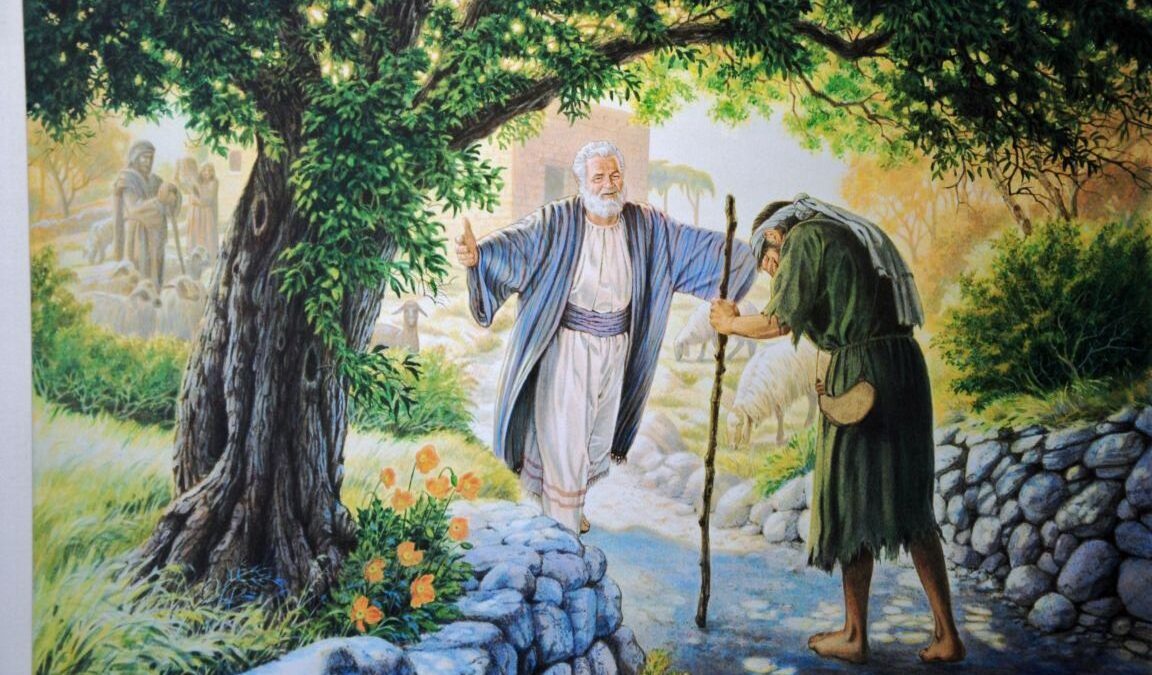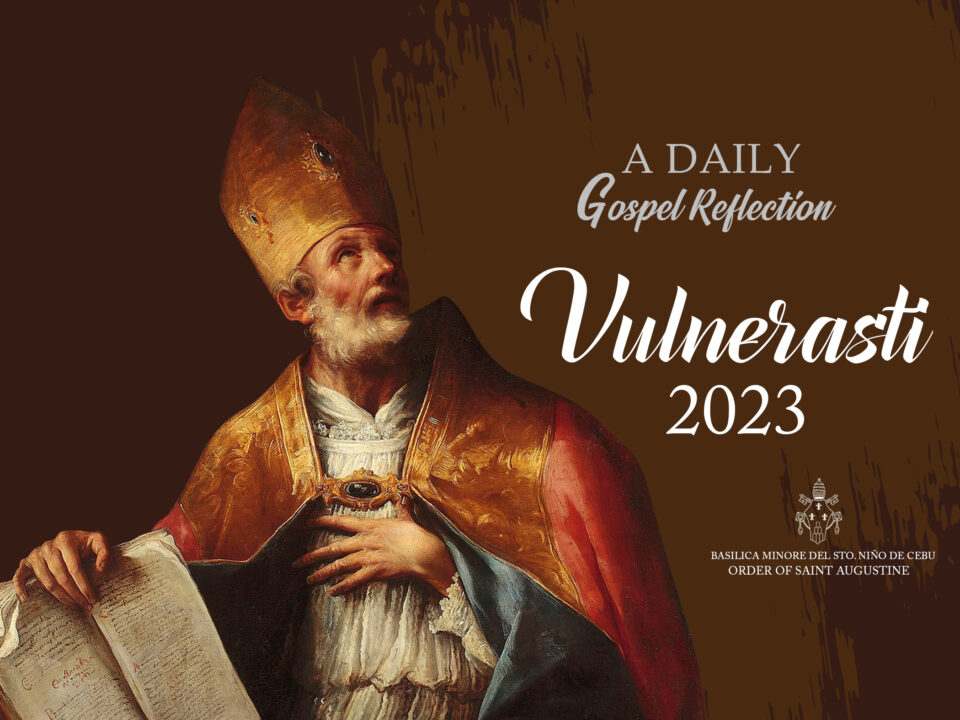Sunday | Fourth Sunday of Lent

https://achristianpilgrim.wordpress.com/2016/03/05/the-loving-and-merciful-father/
Today’s Reflection
Gospel: Lk 15:1-3,11-32
March 27, 2022 | Sunday
Meanwhile tax collectors and sinners were seeking the company of Jesus, all of them eager to hear what he had to say. But the Pharisees and the teachers of the law frowned at this, muttering, “This man welcomes sinners and eats with them.” So Jesus told them this parable:
Jesus continued, “There was a man with two sons. The younger said to his father, ‘Give me my share of the estate.’ So the father divided his property between them.
Some days later, the younger son gathered all his belongings and started off for a distant land, where he squandered his wealth in loose living. Having spent everything, he was hard pressed when a severe famine broke out in that land. So he hired himself out to a well-to-do citizen of that place, and was sent to work on a pig farm. So famished was he, that he longed to fill his stomach even with the food given to the pigs, but no one offered him anything.
Finally coming to his senses, he said, ‘How many of my father’s hired workers have food to spare, and here I am starving to death! I will get up and go back to my father, and say to him, Father, I have sinned against God, and before you. I no longer deserve to be called your son. Treat me then as one of your hired servants.’ With that thought in mind, he set off for his father’s house.
He was still a long way off, when his father caught sight of him. His father was so deeply moved with compassion that he ran out to meet him, threw his arms around his neck and kissed him. The son said, ‘Father, I have sinned against Heaven and before you. I no longer deserve to becalled your son.’
But the father turned to his servants: ‘Quick!’ he said. ‘Bring out the finest robe and put it on him! Put a ring on his finger and sandals on his feet! Take the fattened calf and kill it! We shall celebrate and have a feast, for this son of mine was dead, and has come back to life; he was lost, and is found!’ And the celebration began.
Meanwhile, the elder son had been working in the fields. As he returned and approached the house, he heard the sound of music and dancing. He called one of the servants and asked what it was all about. The servant answered, ‘Your brother has come home safe and sound, and your father is so happy about it that he has ordered this celebration, and killed the fattened calf.’
The elder son became angry, and refused to go in. His father came out and pleaded with him. The son, very indignant, said, ‘Look, I have slaved for you all these years. Never have I disobeyed your orders. Yet you have never given me even a young goat to celebrate with my friends. But when this son of yours returns, after squandering your property with loose women, you kill the fattened calf for him!’
The father said, ‘My son, you are always with me, and everything I have is yours. But this brother of yours was dead, and has come back to life; he was lost, and is found. And for that we had to rejoice and be glad.’”
Today’s Reflection:
Agitated by a student who calls him a liar for failing to substantiate his claims, a Filipino politician tells that student: “I am more important than you.” This statement speaks volumes about an inflated sense of self-importance from which many of us tend to suffer. Jesus seeks to save us from this disastrous tendency. He would like us to come to terms with the hard truth that we are not as important or as privileged as we often think we are.
Such is what he would like the Pharisees and the scribes to realize in the Gospel Reading. These religious leaders are often portrayed as having a bloated sense of self-importance. Well-schooled in Jewish law and tradition, they think that they are privileged interpreters of the will of God and that they deserve places of honor in synagogues and banquets (cf. Lk 11:43; 20:46). In response to their charge that Jesus welcomes sinners and eats with them (Lk 15:1-3), the Lord tells them the Parable of the Lost Son, which is perhaps his most famous parable on repentance (Lk 15:11-32). As I mentioned in the previous reflection (March 20), the word “metanoia”, Greek for repentance, is best understood as a radical change of mind. This is intimated in its etymology in which the word is a combination of the preposition “meta” (beyond) which suggests “change or transformation” and the noun “nous” (mind).
In the Parable, Jesus exhorts the Pharisees and the scribes as well as the rest of his hearers to repent. What he specifically means is that they must radically change their mindsets on two things. The first is that they must shatter their conventional image of God as a legalistic and stiff judge who excludes those who fail to observe the law. This is illustrated in the father’s act of rejoicing at the return of the estranged younger son who has squandered his share of the father’s property. Worse, his rehearsed speech smacks of insincerity and deception. What he intends is to take advantage of his father’s kindness the second time around.
The second is that they must stop believing that God is exclusively revealed in their religious tradition and that they are the privileged recipient of God’s grace. That God is also revealed to outsiders and that he extends his saving grace to them is suggested in how the father goes “outside” his home twice in the story. First, upon seeing his returning younger son from afar, he runs out of his home to meet him (Lk 15:20). Second, when the enraged elder son refuses to get in their home and join the feast, the father goes out and pleads that he joins them inside. It should be recalled that when the Lord started his ministry in Nazareth, he made it clear that God’s offer of salvation is also extended to non-Jews. He reminded his Jewish hearers of a couple of OT events in which the prophets Elijah and Elisha were sent to extend God’s saving grace specifically to the outsiders (cf. Lk 4:16-30).
Jesus makes it clear that the Pharisees and the scribes who must have readily identified with the elder son are in no way excluded from the Kingdom of God as shown in the father’s assurance: “Son, you are always with me, and all that is mine is yours” (Lk 15:31). But they are not immediately convinced as hinted by the story’s silence on whether the elder son finally joins the feasting. Implied herein is that repentance or radical change of mind is a rather long and tedious process. The Lord tacitly accentuates the act of repentance as a “process” by using the verb “metanoeo” (μετανοέω) no less than twelve times in the Gospels (Mt 4:17; 11:21; 12:41; Mk 1:15; Lk 10:13; 11:32; 13:3, 5; 15:7, 10; 16:30; 17:4). In contrast, he uses only the noun μετάνοια once (Lk 5:32).
Abandoning our long-used paradigms or mindsets and embracing new ones take a long and difficult process indeed. For example, it was only in 1996, or it took about 350 years for the Church to have formally apologized for condemning Galileo Galilei (1564-1642) whose theory that the sun rather than the earth is the center of the solar system runs contrary to the earth-centered universe suggested in the biblical creation stories. Similarly, coming to terms with the hard truth that we are not as important as we think we are is a long but a liberating process. It frees us from the delusion that the world revolves around us. Once we’ll have profoundly realized that we are not the center of the world, we shall become kinder to others, more tolerant of those who don’t share our worldviews, and more open to change. These attitudinal changes are some of the concrete signs of true repentance. /Vulnerasti, 2022



